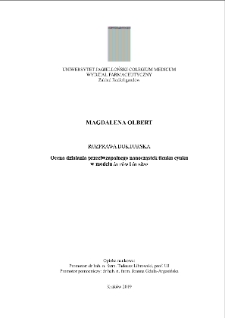Object
Title: Evaluation of anti-inflammatory effects of zinc oxide nanoparticles in vivo and in vitro models
Abstract:
The aim of the study was to assess the anti-inflammatory and gastroprotective effects of nanoparticles and the standard form of ZnO during the simultaneous use of ketoprofen in rats. In addition, the effect of ZnONP on the pro-inflammatory proteins level in RAW 264.7 cells was determined. The results of in vivo experiments showed the advantage of using nanoparticles over the administration of ZnO in the standard form. A positive effect of ZnONP administered ip a dose of 14 mg/kg for a period of 14 days on the anti-inflammatory activity of ketoprofen was observed. The anti-inflammatory effect of ZnONP at a dose of 14 mg / kg ip in the carrageenan experiment was observed. No changes in the appearance of the gastric mucosa were observed, which indicates the protective effect of both forms of ZnO on the gastric mucosa during simultaneous administration of ketoprofen. In the case of administration of ZnO in the standard form at a dose of 14 mg/kg po and ZnONP, a statistically significant reduction of magnesium concentration in the serum of animals was observed. In vitro studies have shown a decrease in the level of pro-inflammatory proteins COX-2, cPGES and the FP receptor after ZnONP supplementation at 100 and 500 nmol, which may indicate the anti-inflammatory activity of ZnONP. The results of the above experiments allow us to assume that a better absorption of the nanoparticle for ; m of ZnO may be responsible for a beneficial therapeutic effect. Better permeability through biological membranes of ZnONP in the case of ip may result in a stronger synergistic effect of ZnONP and ketoprofen and a stronger anti-inflammatory effect of ZnONP than the ZnO.
Place of publishing:
Level of degree:
Degree discipline:
Degree grantor:
Promoter:
Librowski, Tadeusz ; Gdula-Argasińska, Joanna
Date issued:
Identifier:
Call number:
Language:
Access rights:
Object collections:
Last modified:
Jun 30, 2022
In our library since:
Apr 16, 2021
Number of object content hits:
10
Number of object content views in PDF format
0
All available object's versions:
http://dl.cm-uj.krakow.pl:8080/publication/4415
Show description in RDF format:
Show description in OAI-PMH format:
| Edition name | Date |
|---|---|
| ZB-130327 | Jun 30, 2022 |
Objects
Similar
Olbert, Magdalena
Wnęk, Włodzimierz
Jarosz, Magdalena
Styczeń, Krzysztof
Gosiewski, Tomasz
Płatek, Joanna
Starowicz, Gabriela

